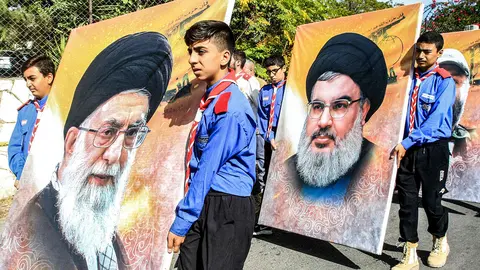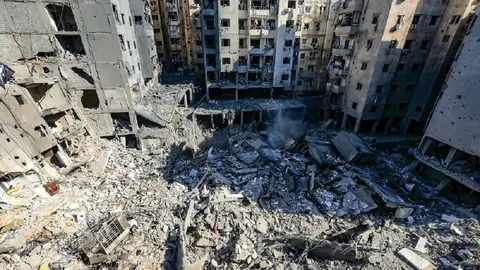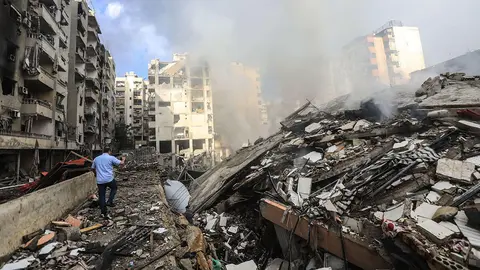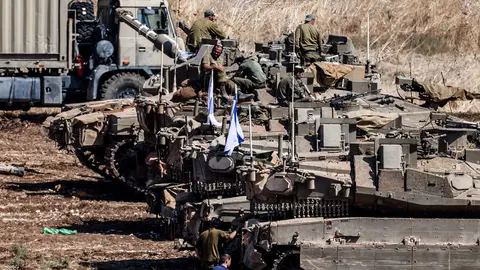Why Iran will not avenge Nasrallah
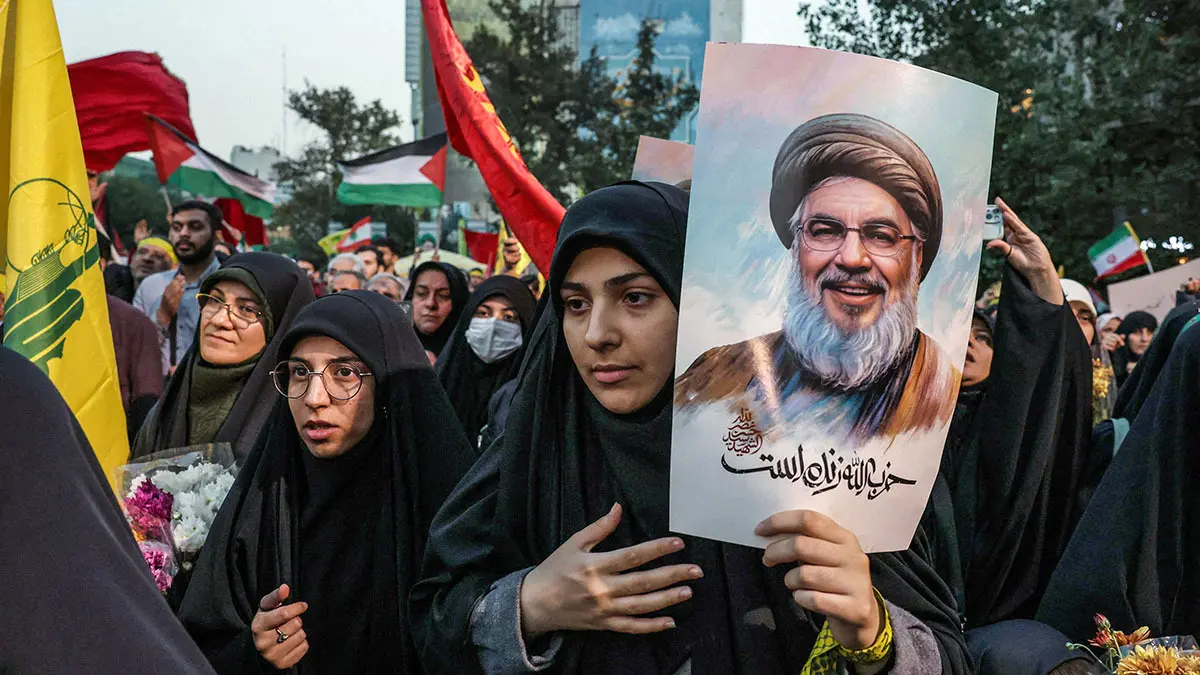
When Iran claims that Nasrallah’s death will only make the party stronger and that someone else will eventually replace him, it knows very well, better than anyone else, that it is deluding itself.
Nasrallah, the smart strategist, undoubtedly knew, without saying so, that the time to deter Israel had passed and that if he were targeted by the Israelis, it would be difficult to avenge him.
Many Lebanese supporters of Hezbollah blame the assassination of the party’s Secretary-General Hassan Nasrallah by pinning the fault on Iran for refusing to retaliate for so many earlier Israeli attacks.
They understood that Iran’s inaction, after the assassination of Hezbollah’s military commander Fouad Shukr in Beirut and Hamas political bureau chief Ismail Haniyeh in Tehran, would only encourage the Israelis to proceed with more escalation.
Those listening to the voice of reason in Lebanon and the Middle East did not buy the naive interpretation voiced by some pseudo-analysts on several Arab satellite channels by which the Israeli calm on the Gaza front reflected its army’s fatigue. They understood that Israel’s military was in fact preparing to change its conflict focus and shift its operations to northern Israel, Lebanon.
The Israelis camouflaged their true aims by staging clashes and raids in the West Bank, while they were preparing for the real war, this time with Hezbollah.
It is difficult to say when the Mossad devised its plans to booby-trap the pagers and walkie-talkies. This occurred months ago, but the first salvo in the new round of this war consisted in exploding the devices to cause the disarray of party members, politicians, activists, and militants and pave the way for severe blows to the party’s leadership, culminating with the assassination of Nasrallah.
The Lebanese, who now look at Iran’s designs with scepticism, believe they were victims of a political deal struck between Tehran and Washington. The Iranian silence has been deafening.
Today, there are no retaliatory measures nor reactions that can match the very heavy blow that Hezbollah has received with the killing of its leader. Even if Iran undertook some kind of response, whatever its military scope, and even if we assumed its action succeeded in penetrating the tight Israeli defences against missiles and drones, such a move would not provide solace to the party’s supporters and the wider pro-Iran constituencies in the region, nor appease their anger.
Nothing can compensate for the loss of Iran’s alliance with Hassan Nasrallah. When Iran claims that Nasrallah’s death will only make the party stronger and that someone else will eventually replace him, it knows very well, better than anyone else, that it is deluding itself. Even if Hezbollah or any of Iran’s regional proxies, or Iran itself, were able to hit a major target in the Israeli leadership hierarchy, no matter how high, even if it were Prime Minister Binyamin Netanyahu himself, nothing would match the level of the strategic loss of Hassan Nasrallah.
Iran involved itself early on in creating an aura of sanctity around Nasrallah. It deemed it important that a black-turbaned Arab figure would rise to speak on behalf of Iran in a region where Tehran has sought to bring off a particular project since 1979, the year of the Iranian revolution and the rise of Ayatollah Khomeini to power.
Ironically, Iran and Hezbollah owe Israel the credit of providing them with the excellent opportunity to establish the party in Lebanon. This came when Israel invaded in 1982 and destroyed the PLO’s militant structure and expelled the organisation from Lebanon. The Revolutionary Guard Corps was quick to fill the vacuum left by the PLO’s exit with the creation of a new entity it called Hezbollah. While the Shia Amal Movement sought to depict its sectarian make-up as just an issue of identity, Hezbollah never hesitated to declare its allegiance to Iran, Khomeini, and later to the Supreme Leader Ayatollah Ali Khamenei.
Israel provided a service to Hezbollah when it assassinated the party’s Secretary-General Abbas al-Musawi in 1992. Hassan Nasrallah took over the leadership and led it to its current achievements, most notably the liberation of southern Lebanon from the Israeli occupation in 2000 and the subsequent expulsion of the pro-Israeli South Lebanon Army militia.
There is no denying the importance of the opportunities created by the regime of the late Syrian President Hafez al-Assad during its occupation of Lebanon under the name of the Arab Deterrent Forces. That turned the Lebanese Shia from third-class citizens, behind the Maronites and the Sunnis, to being the leading group in the country with Hezbollah claiming to speak for it.
The victory achieved by Hezbollah over Israel made Nasrallah an Arab and Islamic icon despite his sectarian symbolism. The party did not hesitate to exploit the Palestinian cause and hostility to Israel to achieve its most important goal, and Iran’s goal, which consisted of the domination of Lebanon as a prelude to domination of the whole region.
Then the invasion of Iraq in 2003 provided greater opportunities for the party. But with the opportunities came also many mistakes made by Hezbollah, starting with the assassination of former Lebanese Prime Minister Rafik Hariri in 2005 and the kidnapping of Israeli soldiers during the 2006 war with Israel (Nasrallah regretted this episode saying, “If I had known”). Subsequently, the party persisted from 2008 in trying to strangle the Lebanese state and eliminate all forms of resistance to its hegemony, all the way playing games of alliances with Lebanese movements and political parties, blocking the selection of a new president, and transforming the Lebanese government into an empty shell.
In no time, Hezbollah became a political and military strike force in the region, intervening to save Bashar al-Assad’s regime and training loyal militias in Yemen and Iraq, and even infiltrating Egypt’s border with Gaza to reach the enclave and arm Hamas.
Now Iran finds itself facing the problem of Nasrallah’s aura of sanctity and how to deal with his physical elimination. Nothing better shows the importance of this aura than the position taken by of the Shia authority in Najaf, which was fully aware of the serious risks involved in the disintegration of this halo of sanctity at the hands of Israel after it was so painstakingly nurtured.
Hassan Nasrallah’s eulogy by the highest Shia authority in Najaf, Grand Ayatollah Ali al-Sistani, was significant in the way it referred to the slain Hezbollah leader compared to great Shia imams.
Sistani said, “Hassan Nasrallah was an unparalleled leadership model,” then he hastened to add, “in recent decades,” hence limiting Nasrallah’s stature in time.
There is no doubt that the highest Shia authority was aware that some of the Shia in Lebanon and elsewhere were elevating Nasrallah to a timeless stature, above many top Shia clerics, both living and dead. From this perspective, the status of Hassan Nasrallah, it thought, should be reduced to that of “martyr” and “hero,” which the Shia should mourn the way they mourned Qassem Soleimani, then go back to work on the Iranian-directed project.
If Hassan Nasrallah were allowed to become a “saint,” it would have been quite difficult to avoid avenging him.
The problem of carrying out any revenge started to surface even when Nasrallah was still alive. The Hezbollah leader realised, along with the senior commanders of the Iranian Revolutionary Guard Corps, that the technological gap between Iranian and Israeli military equipment was huge.
The prevailing impression was initially that the Iranians (and Hezbollah) had considerable means to target Israel. But the shocking realisation of just how limited those means were soon dawned upon Tehran and its Lebanese proxy after the attack on the Iranian consulate in Damascus and the assassination of Revolutionary Guard General Mohammad Reza Zahedi. This was also illustrated by the type of Iranian response. More than 300 ballistic missiles, cruise missiles and drones were launched but none of them managed to make a hit in Israel. All the missiles and drones were shot down by Israel’s Iron Dome and David’s Sling anti-missile systems, or by Israeli and American aircraft.
The scene of Khamenei speaking to the broken-hearted commanders of the Revolutionary Guards after the failure of Iran’s retaliatory attack was decisive in preventing an Iranian response to the series of Israeli assassinations starting with Fuad Shukr and Ismail Haniyeh, and later including Ibrahim Aqil. During his last speech, following the pager and walkie-talkie blasts, Nasrallah was clearly unable to promise a tangible response. The only promises he made were political.
Nasrallah, the smart strategist, undoubtedly knew, without saying so, that the time to deter Israel had passed and that if he were targeted by the Israelis, it would be difficult to avenge him.
In 2006, Nasrallah said, “If I had known.” In 2024, he knew already that Tehran did not want nor was able to avenge him.
Lebanese followers of Hassan Nasrallah blame Iran for letting Israel kill him by not trying to deter the Jewish state after the assassination of Fouad Shukr. However, it was the overall situation that was to blame, starting with the high-risk Hamas launch of Operation “Al-Aqsa Flood,” and the backing it received from Iran and the loyal militia alliance in Lebanon, Iraq, and Yemen.
At the apogee of its influence, Iran had succeeded in imposing its hegemony over the region, with Israel accepting this if its own security was not threatened. This is what happened throughout the so-called Arab Spring period when Israel distanced itself even from the Syrian civil war, although just a few steps from its borders. It even let Hamas vent steam by occasionally firing a batch of rockets from Gaza and would then still allow Qatari money to pay for the salaries of Hamas fighters.
Iran today does not want to retaliate because any attempt to do so will not deter Israel and may drag Tehran into a confrontation that will cost it further regional losses in Iraq, Yemen, and Syria (Assad’s silence and distancing his country from the confrontation are already a type of loss). More importantly, Iran fears that the Israelis or the West will respond by targeting Iranian installations and military.
There will be those in Lebanon and outside of Lebanon who will shed many tears for Hassan Nasrallah, but all revenge-seekers are unlikely to see their wishes fulfilled by Iran.
Haitham El-Zobaidi is the Executive Editor of Al Arab Publishing House.


